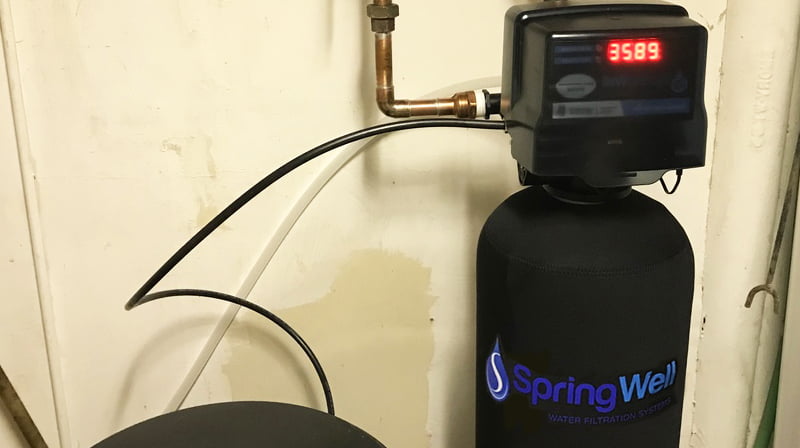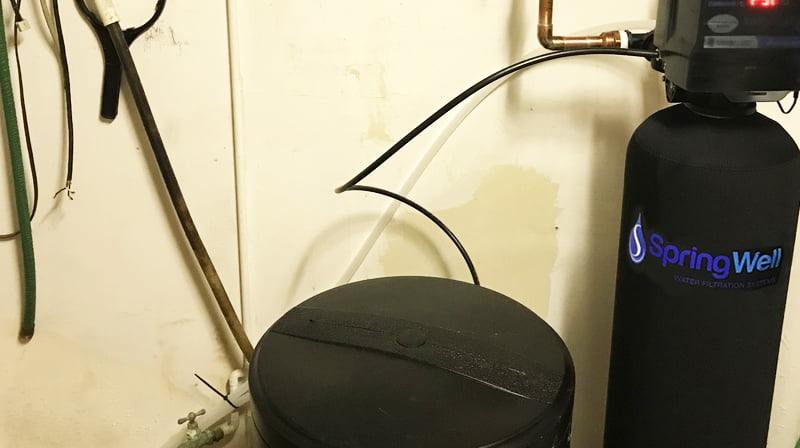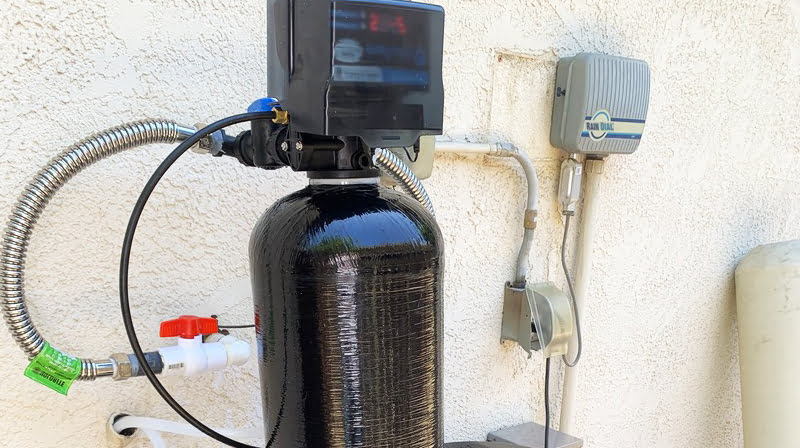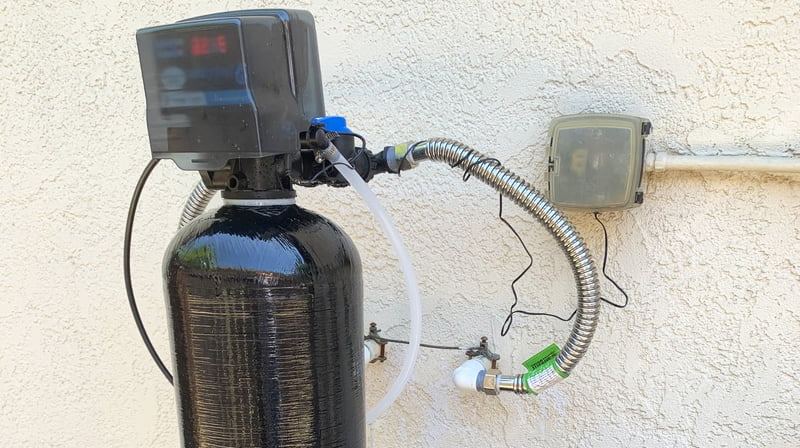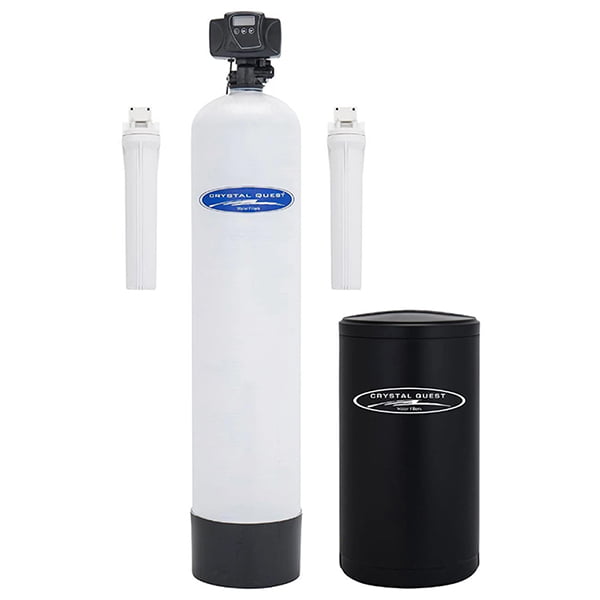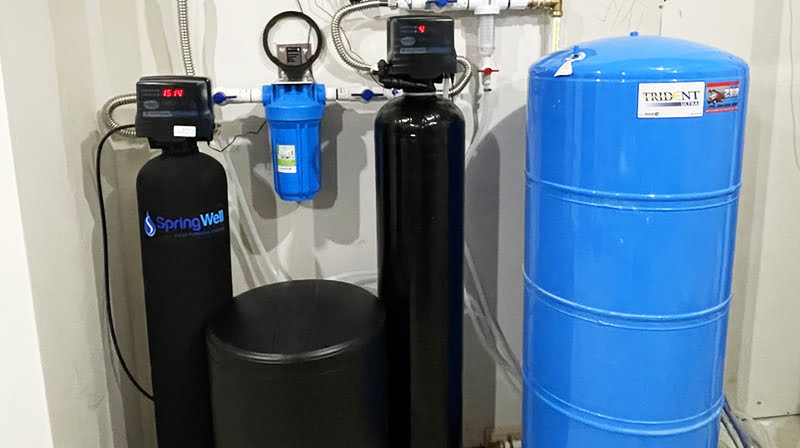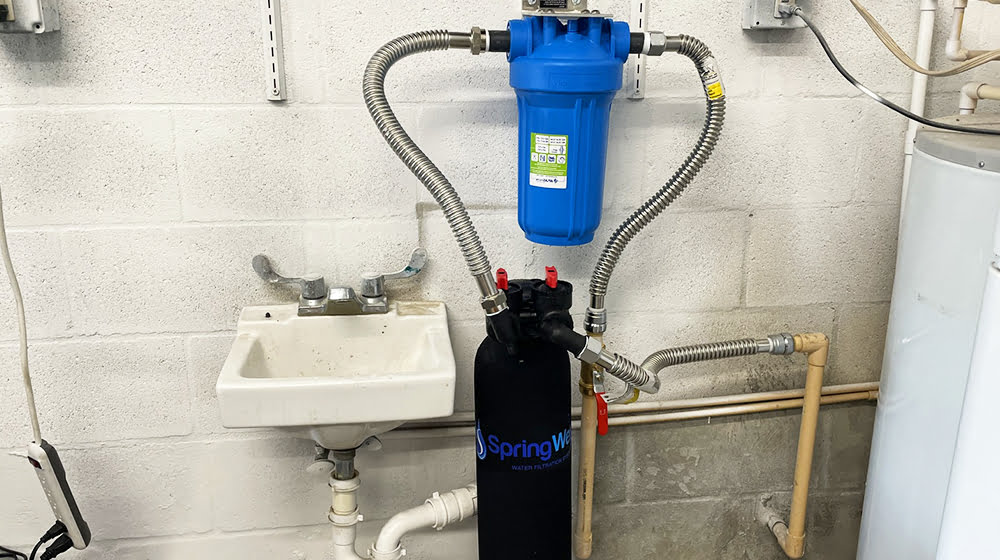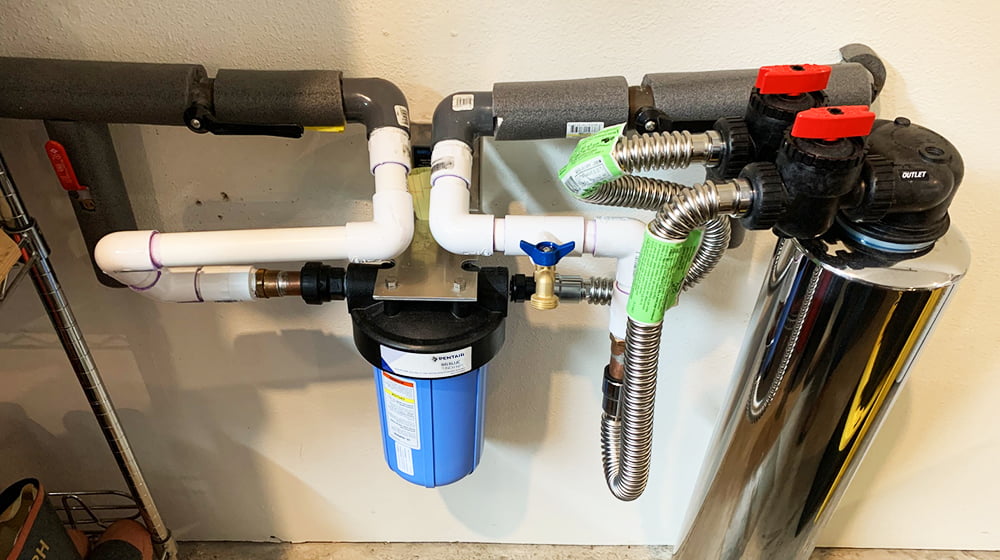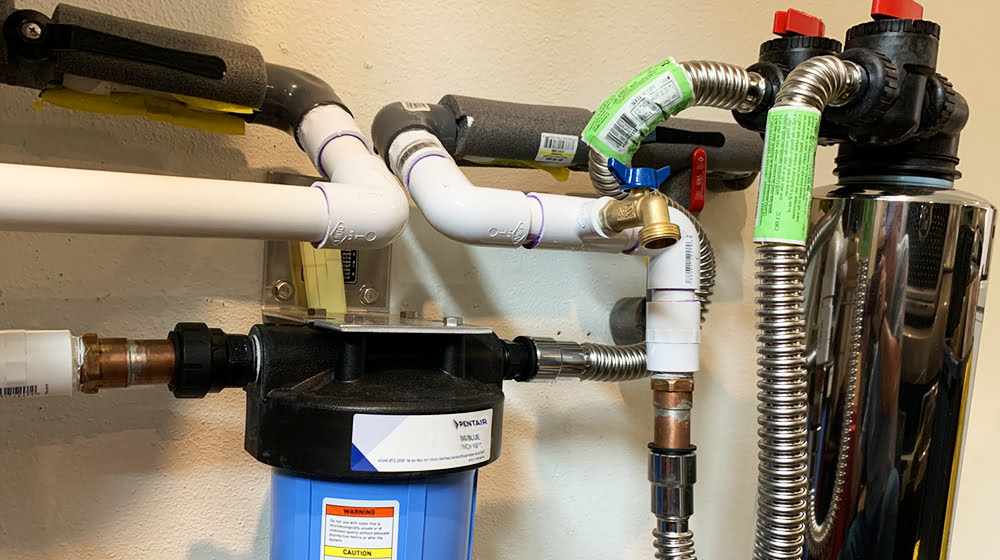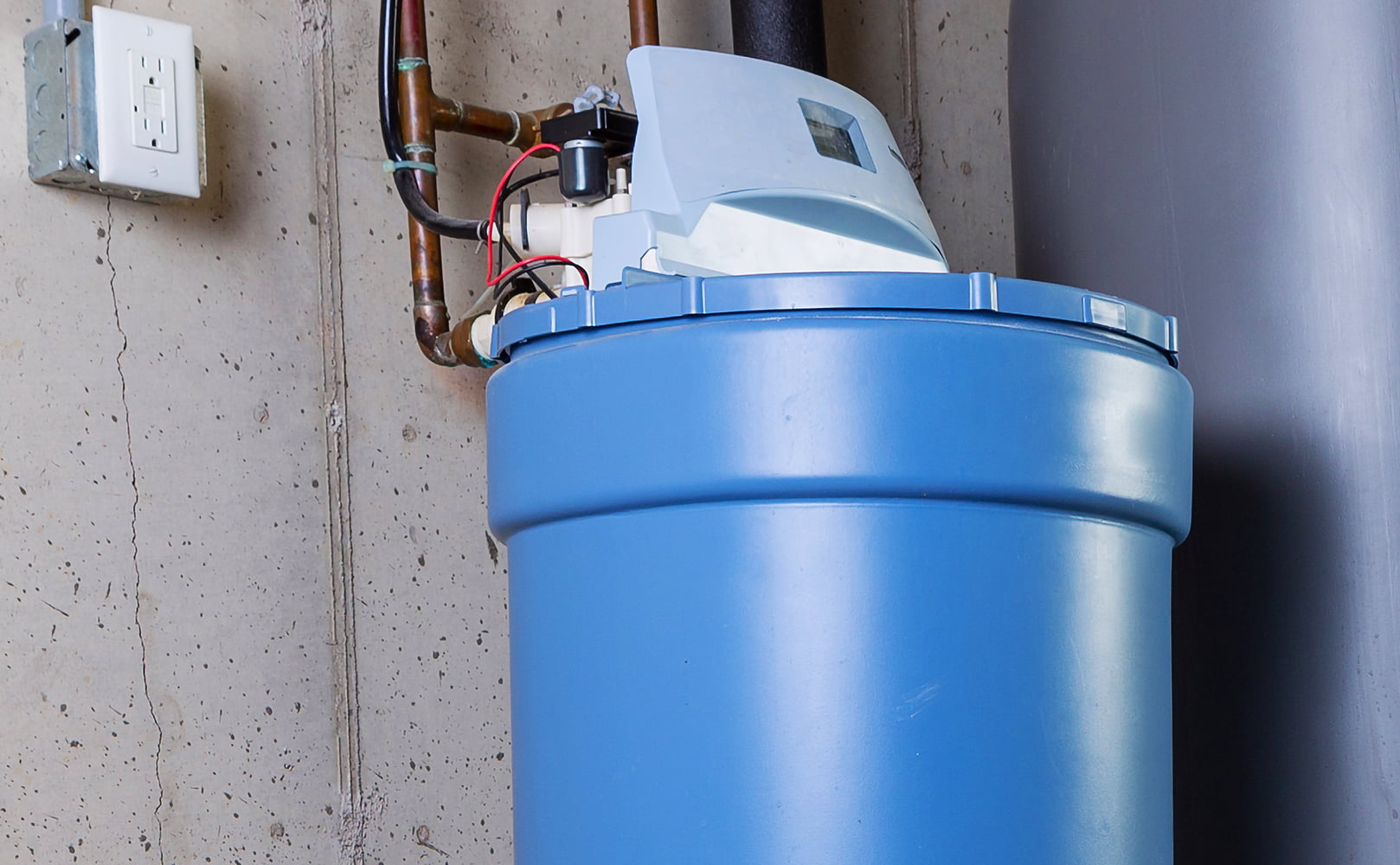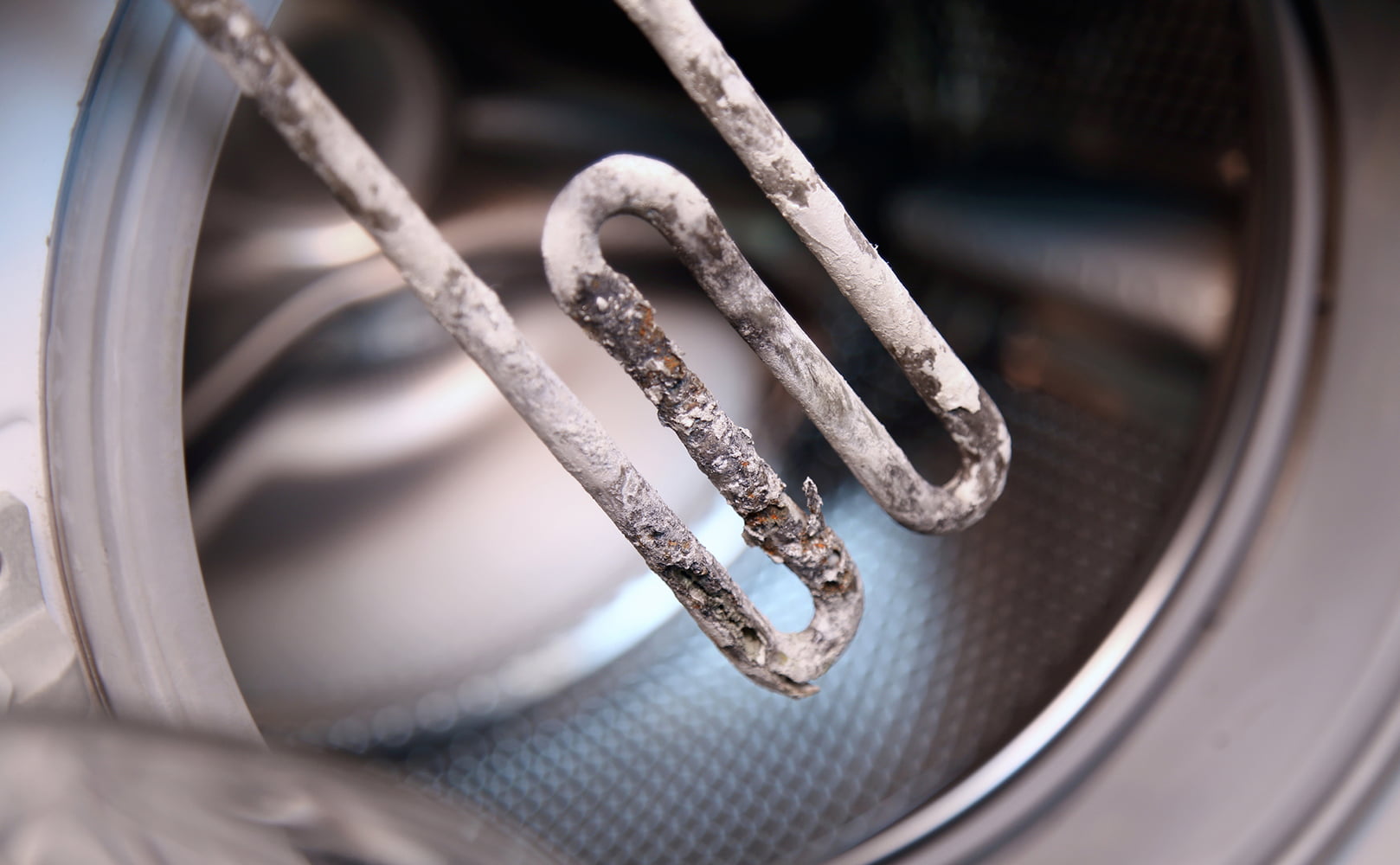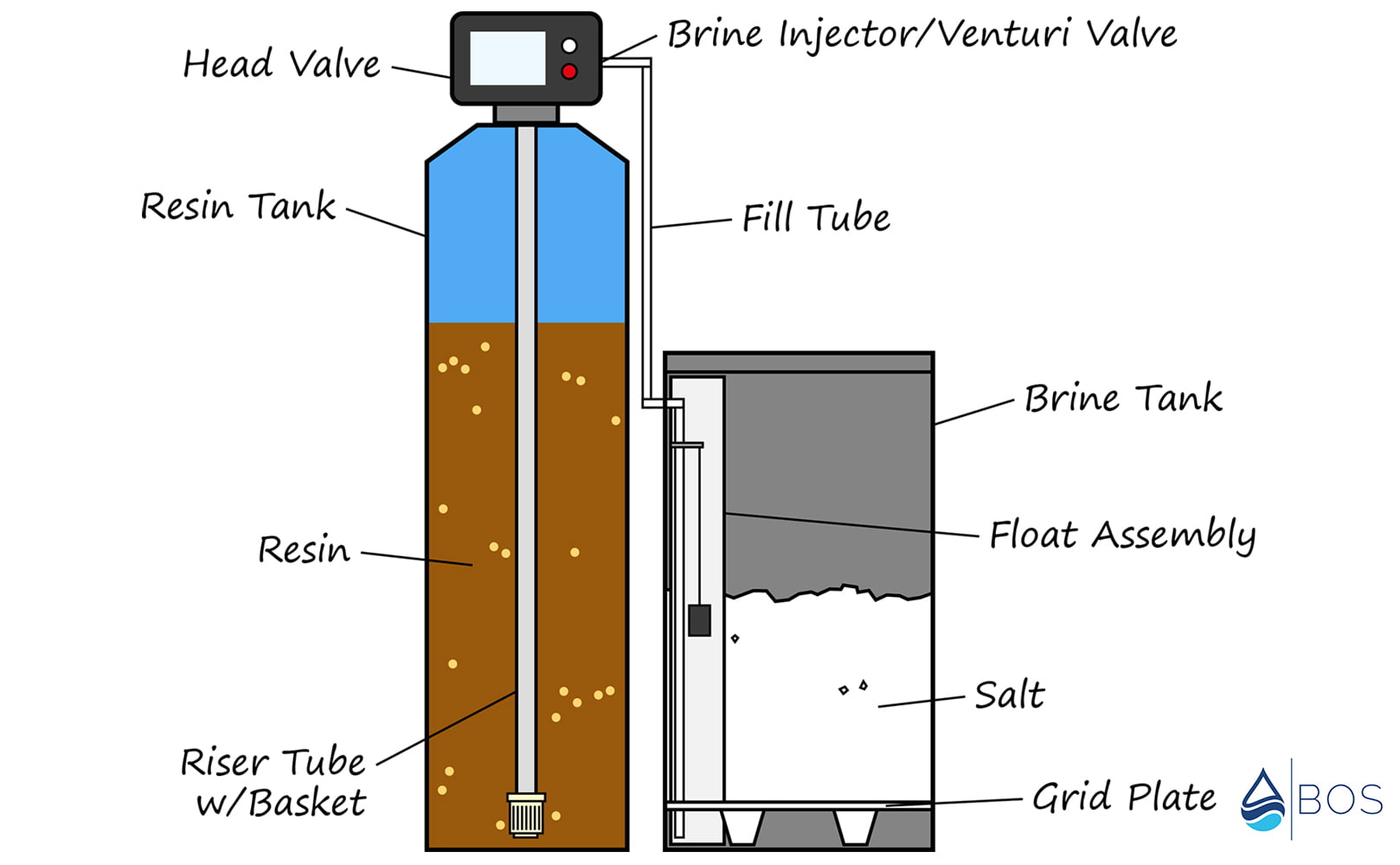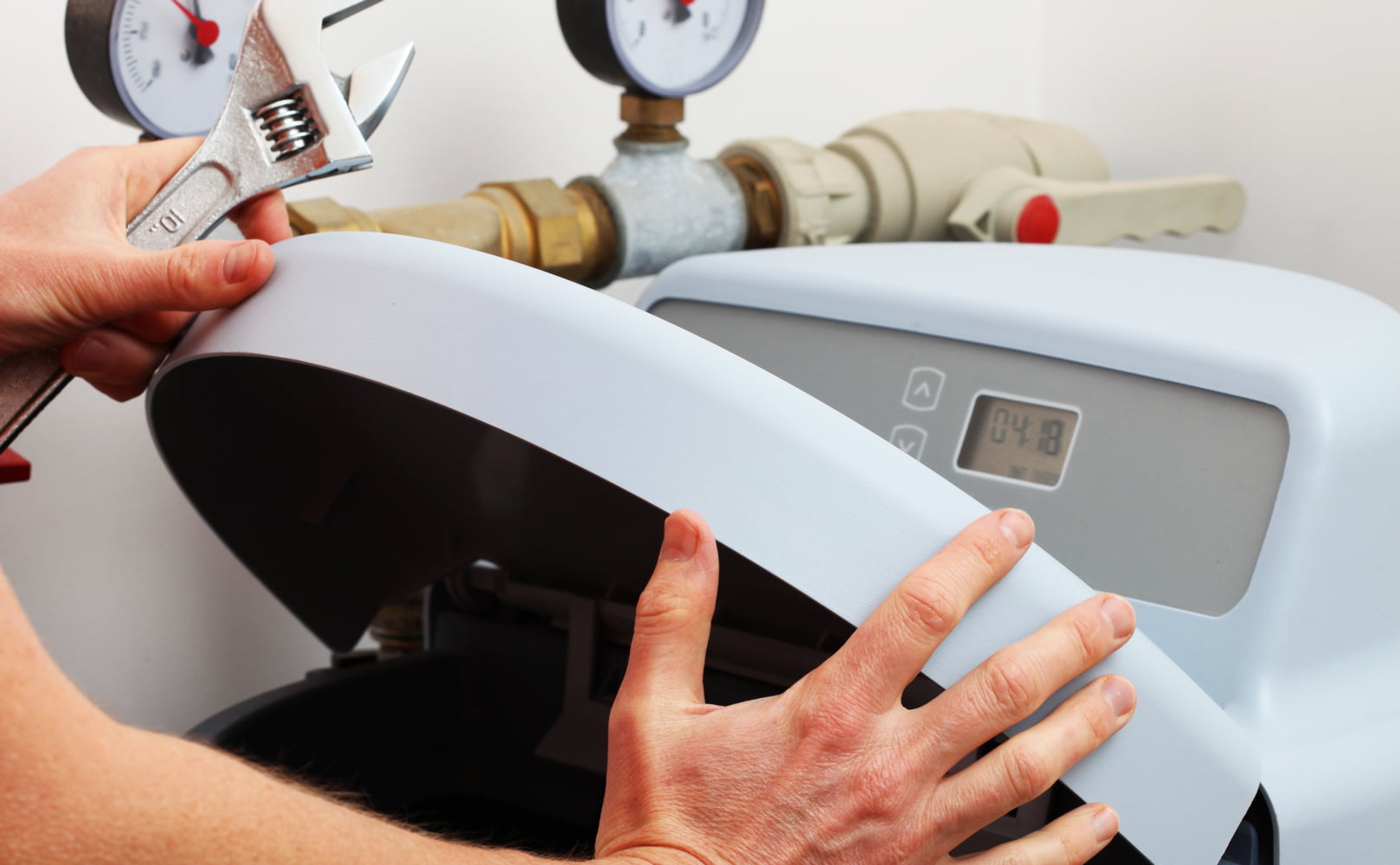7 Best Water Softeners for Well Water (with Iron) *Update 2024
Written by: Alexandra Uta // Last Updated: Jan 31, 2024
This page may contain affiliate links. If you buy a product or service through such a link we earn a commission at no extra cost to you. Learn more.
Top Pick: What’s the Best Water Softener for Well Water?
The best water softener for well water in 2024 is the SpringWell SS, because it removes any hardness from water protecting your home and family. Also, it can handle 3 ppm iron, saves water and salt during regen, is suited for small to large homes, it is easy to set up, monitor, and maintain, and it comes with a 6-month money-back guarantee and lifetime warranty.
Discovering the ideal solution for treating hard well water throughout your entire home can be quite the challenge, given the overwhelming number of water softeners available in the market.
Well, our team of experts has meticulously analyzed and evaluated over 37 different models to simplify your decision-making process. We have invested substantial time and effort in thoroughly researching, reviewing, testing, and ranking water softeners that are specifically designed for well water (for iron). Our hope is that this in-depth analysis will empower you to select the ideal softener that precisely caters to your unique requirements.
No Time to Read? Check Our List of the Best Water Softeners for Well Water!
| Systems | Details | |
|---|---|---|
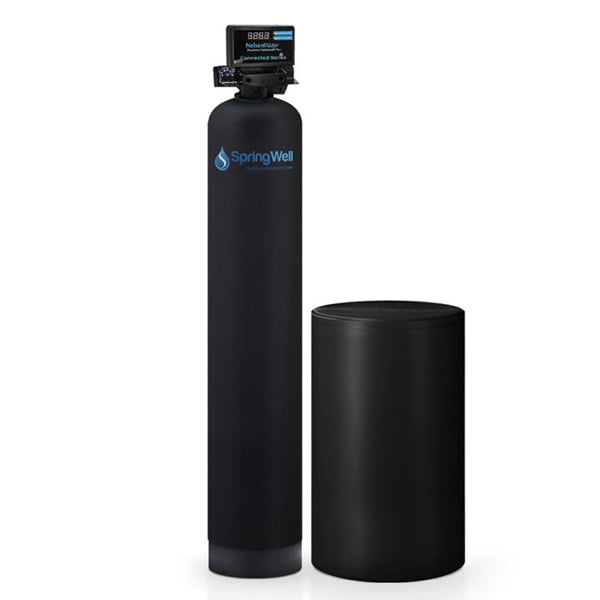 Best Overall: SpringWell SS Water Softener |
Overall Rating: 5.0/5.0
Get 5% Off! Use Code: |
Price: $$$ Type: Salt-Based (Ion Exchange) Water For: 1 to 6+ People (11-20 gpm) Grain Capacity: 32,000-80,000 Iron: ≤ 3 ppm Read Review: Click |
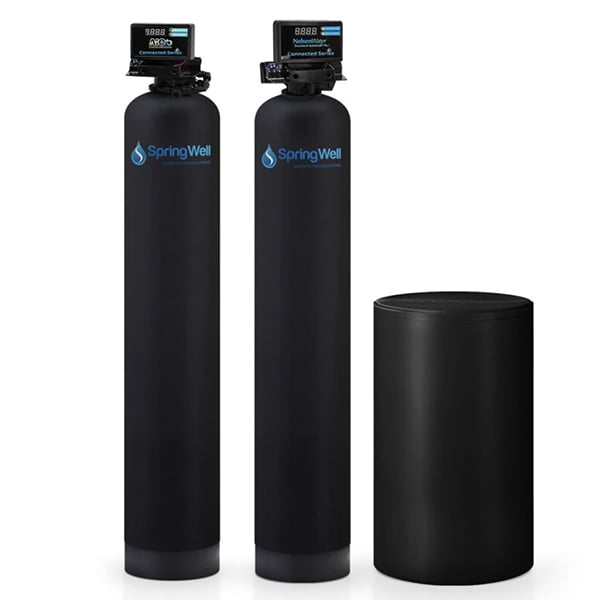 Best for High Iron Content: SpringWell WSSS Filter-Softener Combo |
Overall Rating: 5.0/5.0
Get 5% Off! Use Code: |
Price: $$$ Type: Salt-Based (Ion Exchange) Water For: 1 to 6+ People (11-20 gpm) Grain Capacity: 32,000-80,000 Iron: ≤ 10 ppm Read Review: Click |
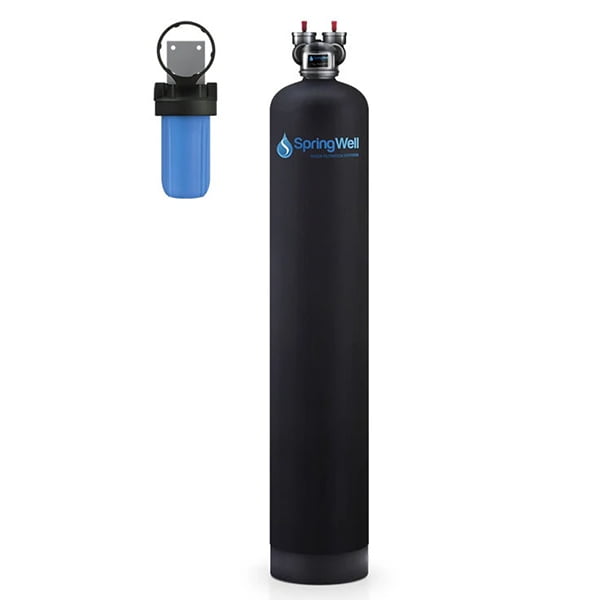 Best Water Conditioner for Well Water: FutureSoft |
Overall Rating: 5.0/5.0
Get 5% Off! Use Code: |
Price: $$$ Type: TAC Water For: 1 to 6+ People (12-20 gpm) Grain Capacity: – Iron: – Read Review: Click Mike’s Video Review: Click |
 Best for Electronic Water Descaling: Eddy |
Overall Rating: 4.5/5.0
|
Price: $ Type: Electromagnetic Water For: Small to Large Homes Grain Capacity: – Iron: – Read Review: Click |
Well Water Softener Reviews
Our Top Picks
- SpringWell SS Water Softener Series – Best Overall
- Crystal Quest Water Softener with Pre/Post Filtration – Runner-Up
- SpringWell WSSS Well Filter-Softener Combo – Best for High Iron Levels
- SpringWell FutureSoft Water Conditioner – Best for Salt-Free Treatment
- Tier1 Everyday and Advanced Water Softener Series – Best Budget Pick
- Eddy Electronic – Best for Electronic Descaling
- SoftPro Elite Well+ Water Softener
1. Best Overall: SpringWell SS Water Softener
In our opinion, the best water softener for well water in 2024 is the SpringWell SS. The system comes in 3 sizes for different flow rates. The SS1 is for homes with 1-3 bathrooms. The SS4 for homes with 4-6 bathrooms. And the SS+ is for very large houses with 7+ bathrooms.
Most importantly, SpringWell SS water softeners eliminate hard water by removing calcium, magnesium, and other hardness minerals through ion exchange. The result: No more scaling in your plumbing system, water-using appliances, and fixtures for reduced maintenance requirements, fewer repairs, and an overall increased lifespan. Additional side effects include a higher efficiency of your water heater, no more ugly spotting on surfaces, and your hair, skin, and clothes will feel nice and soft, too.
On top of that, this is also the best water softener for iron removal (up to 3 ppm clear-water iron).
What does SpringWell do better compared to other salt-based water softeners on the market? They combine demand-initiated regeneration with a Vortech resin tank to achieve supreme salt and water efficiency while regenerating, the digital control head is Bluetooth-compatible which allows for easy programming and monitoring, there’s a 6-month money-back guarantee and a lifetime warranty – and the list goes on. 5 stars!
Gallery
Other Specs
- Model: SS1, SS4, SS+
- Last Price: $1530.94-$2086.32
- Water Flow Rate: 11-20 gpm
- Backwash Rate: 2-4 gpm
- WxHxD: 9-13″x48-54″x9-13″
- Brine Tank: 18″x33″x18″
- Water Temperature: 36-120 °F
- Water Pressure: 25-80 psi
- Water pH: 6.5-10
- Fitting: 1″
- Warranty: Lifetime (Limited)
Key Features & Pros
- Traditional ion exchange water softening using sodium or potassium is the most effective way to turn hard water into soft water.
- Can handle up to 3 ppm clear-water iron + 1 ppm manganese/hydrogen sulfide.
- Water softener comes in 3 sizes:
- SS1 system features a 32,000-grain mineral tank. Rated at 11 gallons per minute water flow ideal for households with 1 to 3 bathrooms.
- SpringWell SS4 has 48,000 grains softening resin. 13 gallons per minute service flow is enough soft water for 4-6 bathrooms.
- SS+ comes with 80,000-grain resin tank. 20 gpm is only really needed if your house is very large with 7 or more bathrooms.
- 10% crosslink resin is more chlorine-resistant than standard 8% resin. Lasts up to 2x longer if you chlorinate your well.
- Water softener can be programmed via Bluetooth using a tablet or smartphone + Legacy View app (available for iOS and Android).
- This is optional. You can configure digital control head the old-fashioned way if you want.
- Digital-metered system measures soft water usage to adjust salt dose and water when regenerating. Highly efficient. #moneysaver
- Vortech plate in resin tank increases backwashing efficiency by as much as 30 percent.
- Every system component is NSF-certified for structural integrity.
- Protective neoprene tank sleeve is part of the package.
- SpringWell water softening systems are designed for DIY installation.
- Bypass valve + installation kit included.
- You can return the product within the first 6 months after purchase in case you’re not satisfied and receive a full refund.
- Warranty covers entire system for lifetime.
- SpringWell customer support is A+. These guys are super knowledgeable and will help you solve any problem.
Cons
- Larger investment upfront.
- Pays back in the long run due to high efficiency and longevity.
Our Rating
- Softening Performance: 5.0/5.0
- Softening Capacity: 5.0/5.0
- Purchase Price: 4.0/5.0
- Annual Cost: 5.0/5.0
- Overall: 5.0/5.0
Best for
The SpringWell SS is best for salt-based water softening with a system that’s easy to install and maintain, and highly effective.
→ Detailed SpringWell Water Softener Review
2. Well Water Softener Alternative: Crystal Quest with Pre/Post Filtration
For us, the number one well water softener alternative to the SpringWell SS series is the Crystal Quest whole house water softener setup. It combines traditional water softening to reduce water hardness with pre- and post-filtration. The latter removes
- sediment to protect the water softener from clogging/fouling.
- different chemicals and organic contaminants which not only makes your water taste better but also improves its healthiness.
4.5 stars!
Other Specs
- Model: CQE-WH-01123, CQE-WH-01124
- Last Price: $1,531.00-$1,633.00
- Water Flow Rate: 9-13 gpm
- WxHxD: 10-12″x52-54″x10-12″
- Brine Tank: 18″x33″x18″
- Water Temperature: 35-100 °F
- Water Pressure: 20-60 psi
- Fitting: 3/4″ or 1″
- Warranty: 1 Year
Key Features & Pros
- System is made in the US.
- 20″ pre-filter removes sediment, dirt, sand, etc.
- Eaglesorb ion exchange water softener resin binds hard water minerals (calcium and magnesium).
- Prevents new scale deposits from building.
- Can treat up to 3 ppm ferrous (clear-water) iron.
- 20″ activated carbon block post-filter (5 microns nominal) adsorbs chlorine, bad taste and odor, VOCs, pesticides, and other potentially harmful contaminants that could be lurking in your well.
- Choose:
- 1.5 cubic feet resin system if your home has 1-3 bathrooms. Water flow: 9 to 11 gpm.
- 2.0 cubic feet resin system if your home has 4-6 bathrooms. Service flow rate: 10 to 13 gpm.
- Regeneration cycles only kick in when the remaining softening capacity is low.
- Demand-initiated regen is most water and salt-efficient.
- All parts are NSF Standard 61 certified to comply with safety and health standards.
- Upgrade resin tank from fiberglass to stainless steel for longevity.
- Easy to install if you’re handy with tools.
- Maintaining this home water softening system is a breeze.
- The resin lasts up to 10 years, depending on your average daily water usage and the condition of your well water supply.
- Both pre and post-filter last 12-18 months. Cost: ~$50-75 a year which seems reasonable.
- Backed by one-year warranty for peace of mind.
Cons
- High quality means higher price tag.
Our Rating
- Softening Performance: 4.5/5.0
- Softening Capacity: 5.0/5.0
- Purchase Price: 4.0/5.0
- Annual Cost: 5.0/5.0
- Overall: 4.5/5.0
Best for
The Crystal Quest is best for people facing hard well water laden with sediment and chemicals.
3. Best Setup for Well Water with Iron Over 3 PPM: SpringWell WSSS Filter-Softener Combo
In our opinion, the best solution for softening well water with high iron content is to use a combo of the SpringWell SS water softener and the SpringWell WS whole house well water filter system.
We’ve already reviewed the SpringWell softener above. It’s salt-based and removes calcium and magnesium using ion exchange technology. Thus, pipes, home appliances, and fixtures are protected from scaling, meaning less maintenance, fewer repairs, and increased lifespan. Other benefits are no more limescale spots on surfaces, softer skin & hair, etc.
If you combine that with the SpringWell WS whole house water filter for well water which uses air injection with greensand filter media you get something powerful enough to deal with almost any iron contamination issue – filters out ferric + ferrous iron up to 10 ppm without problems. 5 stars!
Gallery
Other Specs
- Model: WSSS1, WSSS4
- Last Price: $3189.77-$4266.32
- Water Flow Rate: 11-20 gpm
- Backwash Rate: 5 gpm
- Filter Tank WxHxD (with Head): 10-13″x64″x10-13″
- Softener Tank WxHxD (with Head): 9-13″x57-63″x9-13″
- Brine Tank: 18″x33″x18″
- Water Temperature: 36-120 °F
- Water Pressure: 25-80 psi
- Fitting: 1″
- Warranty: Lifetime (Limited)
Please note: To learn all about the SpringWell SS water softener check the first review. Here are all the important details about the SpringWell whole house water filter:
Key Features & Pros
- Eliminates iron staining and rotten egg smell (from sulfur) + greatly improves drinking water taste.
- Air injection oxidization + greensand filtration filters a maximum combined of ferrous and ferric iron (7 ppm), manganese (1 ppm), hydrogen sulfide (8 ppm).
- Greensand also removes arsenic and radium if present.
- Process requires water pH of 6.5 – 10 to be effective.
- A spin-down sediment pre-filter traps large bits and pieces of dirt.
- Water flow rate is limited by softening system:
- At 11 gallons per minute, SpringWell WSSS1 combo is ideal for 1 to 3-bathroom houses.
- SpringWell WSSS4 provides 20 gpm which is perfect for 4 to 6 bathrooms.
- Compressed air pocket in the top of the tank needs to reset daily. Greensand filter media requires periodic backwashing to remove any trapped iron and manganese etc.
- Automatically controlled by digital control head unit. Set and forget!
- Requires nothing but water for backwashing. No harsh chemicals.
- Control head has Bluetooth connectivity built in. Programmable via mobile app.
- Detailed installation instructions and bypass valve facilitate do-it-yourself install.
- SpringWell WS well water filters are 100% maintenance-free. The greensand bed lasts as long as 10+ years.
- Manufacturer promises full refund for the first 6 months if you’re not satisfied with the performance.
- All parts are warranted for lifetime (limited).
- Excellent customer support.
Cons
- We would have preferred metal fittings rather than plastic.
Our Rating
- Softening Performance: 5.0/5.0
- Softening Capacity: 5.0/5.0
- Purchase Price: 4.0/5.0
- Annual Cost: 5.0/5.0
- Overall: 5.0/5.0
Best for
The SpringWell WSSS combo is best for water with increased hardness and iron levels.
4. Best Salt-Free System for Well Water: SpringWell FutureSoft
If you’re not a big fan of water softeners that rely on salt to take care of water hardness you’ll like SpringWell’s FutureSoft salt-free water softener. If you ask us, it’s the best of its kind using Template Assisted Crystallization (TAC) to crystallize all minerals causing hard water so they remain suspended and not adhere to surfaces.
This means that your water won’t be softened in the actual sense. It’ll still contain the same amount of calcium and magnesium. However, scaling is inhibited by as much as 99.6%. What’s more, already existing scale deposits will vanish with time – great for your home’s pipes, the water heater, the dishwasher, shower heads, and so on. And there’re more benefits which you’ll learn about below. 5 stars!
Important: If your well water contains noticeable levels of iron, manganese, hydrogen sulfide, or copper additional pre-filtration is required. We recommend the SpringWell WS whole house water filtration system as introduced on top. The filter-conditioner combination can be purchased here.

SpringWell FutureSoft Salt-Free Softener |
|
| Unit Price: | $$$ |
| Process: | TAC |
| Household Size: | Up to 6+ People |
| Tank: | – |
| Iron: | – |
|
Overall Rating: 5.0/5.0
Get 5% Off! Use Code: |
|
Mike’s Video Review
Mike is one of our inhouse video content producers, and he has ordered, installed, and tested the SpringWell FS Salt-Free Water Softener for us on his own water supply. You cannot get more hands-on experience than that! Mike has documented the entire process and shares his opinion the video below:
Other Specs
- Model: FS1, FS4, FS+
- Last Price: $1542.86-$2567.03
- Water Flow Rate: 12-20 gpm
- Max Hardness: 81 gpg
- WxHxD: 6-13″x35-54″x6-13″
- Water Temperature: 34-120 °F
- Water Pressure: 20-80 psi
- Water pH: 7.0-9.5
- Fitting: 1-1.5″
- Warranty: Lifetime (Limited)
Key Features & Pros
- Based on the size of your family and home, choose between these 3 systems:
- FutureSoft FS1 for 1-3 bathrooms. 12 gpm flow rate.
- FutureSoft FS2 for 4-6 bathrooms. 15 gpm service flow.
- FutureSoft FS+ for 7+ bathrooms. 20 gallons of water per minute.
- About the TAC process:
- Effectiveness was verified in a study conducted by Arizona State University. Customer satisfaction is accordingly high.
- Can effectively treat water classified as extremely hard.
- Does not lower water pH. Better for your family’s health and your entire home (acidic water is more corrosive).
- Compared to regular softened water, conditioned water doesn’t have slippery feel.
- Aids healthy hair and skin.
- Scale wipes off easily for fast cleaning.
- Absence of salt and chemicals helps the environment and you don’t have to do any heavy lifting.
- No regeneration required. Saves water.
- Sediment pre-filter protects TAC media. Needs replacement every 6-9 months. Annual cost: ~$40 which really isn’t much.
- Designed to be DIY-installed. Installation kit, detailed step-by-step instructions, and walkthrough video are provided.
- Very low in maintenance thanks to media which lasts infinitely.
- System pays for itself over time.
- Comes with lifetime warranty + 6-month money-back guarantee.
Cons
- Requires pre-filtration if heavy metals or sulfur are present.
Our Rating
- Softening Performance: 5.0/5.0
- Softening Capacity: 5.0/5.0
- Purchase Price: 4.0/5.0
- Annual Cost: 5.0/5.0
- Overall: 5.0/5.0
Best for
The FutureSoft is best for people who like the idea of saltless water softening (conditioning).
5. Best Budget Option: Tier1 Systems
In case you’re looking for a low-budget solution to your hard water problem, you should definitely consider a Tier1 water softener. They’re a “no-frills option”, which by the way doesn’t say anything about their effectiveness. It’s just that there’re a few trade-offs like lower regeneration efficiency and limited water flow when compared to the higher-priced models in this guide.
Which Tier1 should you go for? If you’re okay with a manual bypass valve which shuts off the water supply during regeneration process (about 2 hours), check out the Everyday/Essential series (see picture). They’re the most popular and the most affordable – coincidence? If, however, you’re willing to invest just a tiny bit more we recommend a Tier1 Advanced/Certified water softener which has a few nice extras.

Tier1 Essential Water Softener |
|
| Unit Price: | $ |
| Tech: | Ion Exchange Process |
| Household Size: | Up to 3-4 People |
| Tank: | 32,000-64,000-Grain Capacity |
| Iron: | ? |
|
Overall Rating: 4.0/5.0
|
|
Other Specs
- Model: WS-165-132, WS-165-150, WS-165-164
- Water Flow Rate: 11.2 gpm
- Softener Tank WxHxD (without Head): 9-12″x48-54″x9-12″
- Brine Tank: 15″x34″x15″
- Water Temperature: 40-100 °F
- Water Pressure: 21-120 psi
- Fitting: 3/4″ FPT
- Warranty: 1 Year
Key Features & Pros
- Tier 1 Everyday a.k.a. Essential water softening systems are the cheapest we could find. They’re designed for small to medium-sized households with one to three bathrooms. Choose between:
- 32,000-grain water softener (11.2 gpm).
- 48,000 grains (11.2 gpm).
- 64,000-grain capacity (11.2 gpm).
- Tier 1 Advanced a.k.a. Certified water softener has 48k grains (11.2 gpm). 1-3 bathrooms.
- Resin tank and control head have earned NSF certification.
- Entire system is NSF certified against Standard 44 for hardness reduction which guarantees effectiveness.
- Protective neoprene tank jacket is part of the package.
- No more difficult to install than any other water softener (confirmed by reviewers).
- You can return your Tier1 water softener within the first 90 days after purchase and get a refund.
- Only if purchased on discountfilterstore.com and well water parameters are within the stated specifications.
- Control valve and mineral tank of Everyday series are covered by 1-year warranty.
- Advanced water softener system has 5-year warranty on tank and 3 years on control valve.
Cons
- Softened water flow (and water pressure) is somewhat limited and probably too low if you have more than 3 bathrooms.
- Standard crosslink resin (8%) is more vulnerable to chlorine.
- Installation instructions could do with an overhaul.
- System programming requires some getting used to.
- Manual bypass of Essential water softeners shuts off water supply while regenerating.
- Make sure to schedule regeneration cycle to kick in at night!
Our Rating
- Softening Performance: 3.5/5.0
- Softening Capacity: 5.0/5.0
- Purchase Price: 5.0/5.0
- Annual Cost: 5.0/5.0
- Overall: 4.0/5.0
Best for
Tier1 systems are best for homeowners on a budget.
6. Best for Electronic Well Water Descaling: Eddy
The Eddy Electronic is our number one water descaler in 2024 for both city water and well water. It reduces hard water scaling with the help of electromagnetic waves. Sounds like bogus? It isn’t! The same study that proved Template Assisted Crystallization as used by the SpringWell FutureSoft to be effective also analyzed electromagnetic treatment. The result: It reduced scale formation by about 50%. Now, this is nowhere near perfect but the scientists also found that the remaining scale was “soft” and could be easily removed with the help of a brush. Add to that the small price tag of the Eddy water descaler and you get 4.5 stars from us!

Eddy Electronic Salt-Free Softener |
|
| Unit Price: | $ |
| Technology: | Electromagnetic |
|
Overall Rating: 4.5/5.0
|
|
Other Specs
- Model: ED6002P
- WxHxD: 6.75″x3.5″x1″
- Certifications: CE & FCC
- Warranty: Lifetime
Key Features & Pros
- Electromagnetic wave induction requires 2 coils to be wrapped around the incoming water supply line(s).
- Works with hardness levels of up to 20 grains per gallon.
- Does not remove any healthy magnesium and calcium minerals from the water.
- Environmentally friendly.
- Does not work with iron or galvanized pipes. For all other types, maximum allowed diameter is 1.5″.
- Quick and easy to install. Does not involve plumbing.
- Virtually maintenance-free.
- Cheapest way to handle hard water. No ongoing expenses.
- CE and FCC certified to international standards.
- Manufacturer provides repair and replacement warranty throughout entire product life.
- You can fall back on the 12-month satisfaction guarantee (full refund) if you’re not happy with the results.
Cons
- Does not seem to work for every user.
Our Rating
- Softening Performance: 4.0/5.0
- Softening Capacity: 5.0/5.0
- Purchase Price: 5.0/5.0
- Annual Cost: 5.0/5.0
- Overall: 4.5/5.0
Best for
The Eddy is best for people looking for an effective and affordable electronic water descaler.
7. SoftPro Elite Well+ Water Softener
The SoftPro Elite is another solid water softener for any well water supply. We recommend either the Well+ Basic version for salt-based water softening + ferrous iron filtration (up to 3 ppm), or the Well+ KDF if you want to soften your water and get rid of ferrous (up to 3 ppm) and other heavy metals, and sulfur (up to 2 ppm) at the same time.
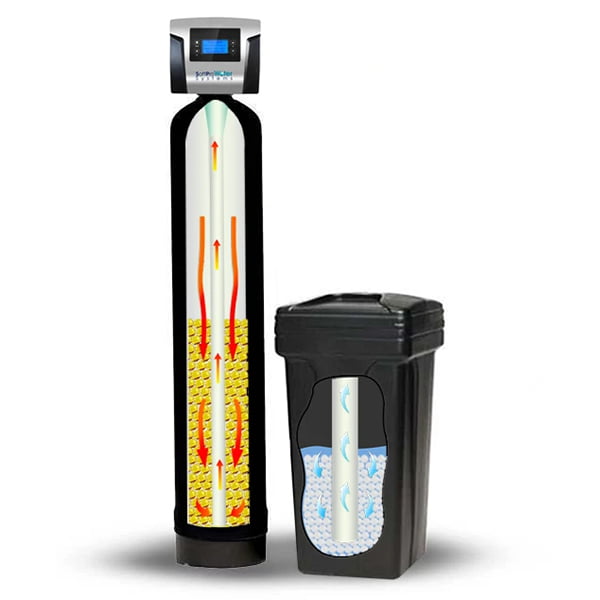
SoftPro Elite Well+ Basic Water Softening System |
|
| Unit Price: | $$$ |
| Tech: | Ion Exchange Process |
| Household Size: | Up to 6 People |
| Tank: | 48,000-Grain Capacity |
| Iron: | Up to 3 ppm |
|
Overall Rating: 4.0/5.0
|
|
Other Specs
- Model: Well+ Basic
- Last Price: $997.00-$1,499.00
- Peak Flow Rate: 10-23 gpm
- WxHxD: 8-12″x44-54″x8-12″
- Brine Tank: 15-18″x33-35″x15-18″
- Fitting: 1″
- Warranty: Lifetime (Limited)
Key Features & Pros
- Grain capacities range from 24,000 to 80,000 (64,000). Choose the system size and flow rate – ranges from 10 all the way up to 20 gpm – which fits your home best.
- Most home owners probably want to go for 40,000-48,000 grains.
- Filled with fine mesh resin for better iron removal.
- SoftPro Well+ KDF system uses bacteriostatic KDF-85 to control bacteria growth inside the resin tank.
- Demand-initiated regeneration process saves water and salt.
- Neoprene tank jacket provides protection and insulation.
- Water softeners are easy to install.
- Built-in bypass.
- Ship with resin pre-loaded.
- Include free 3/4″ stainless steel quick connect hoses at the time of writing this guide.
- Video tutorial can be found on website.
- Large and user-friendly LCD display with touchpad controls allows for easy programming.
- Limited lifetime warranty on tank + control valve.
Cons
- No issues so far.
Our Rating
- Softening Performance: 4.0/5.0
- Softening Capacity: 5.0/5.0
- Purchase Price: 4.5/5.0
- Annual Cost: 5.0/5.0
- Overall: 4.0/5.0
Best for
The SoftPro Elite is best for people on well water who like the idea of a customizable softening system.
Comparison List
(Mobile Hint: Swipe to Scroll)
| Water Softening Systems | Price | Salt Based | GPM | Grains | Iron Removal | Warranty | Additional Info |
|---|---|---|---|---|---|---|---|
| SpringWell SS Water Softener for Well Water | $$$ | Yes | 11-20 | 32,000-80,000 | 3 ppm | Lifetime (Limited) | |
| Crystal Quest Whole House Water Softening System | $$$ | Yes | 9-13 | 48,000-60,000 | 3 ppm | 1 Year | |
| SpringWell WSSS | $$$ | Yes | 11-20 | 32,000-80,000 | 10 ppm | Limited Lifetime | |
| SpringWell FutureSoft Water Softening Unit | $$$ | No | 12-20 | – | – | Lifetime (Limited) | |
| Tier1 Water Softening Unit | $ | Yes | 10-11.2 | 32,000-64,000 | ? | 1 Year | |
| Eddy Water Descaler | $ | No | – | – | – | Lifetime | |
| SoftPro Elite Well+ Water Softening Unit | $$$ | Yes | 10-20 | 24,000-80,000 | 3 ppm | Limited Lifetime |
Buying Guide: How to Choose the Well Water Softener That’s Best for You
The following are key features worth considering when shopping for a well water softener. They will help you choose the right on for your needs and budget.
Pre-Filtration
There is no one-size-fits-all approach to softening hard well water. Sure, you always need a water softener or water conditioner, however, additional pre-filtration might be required.
For example: Water that contains a lot of sediment should run through one or more sediment filter stages before it enters the water softening system. Otherwise, the softener might clog up.
If your water is high in chlorine – think shock chlorination – you want to consider adding a carbon filter which will protect the delicate softening resin.
In case of iron, sulfur and/or manganese, a well water filtration system might be necessary.
Bottom line: Have your water supply tested and, based on the results, make sure to have the right pre-filtration in place.
The Exception: Well Water with Ferrous Iron
Almost any regular salt-based softener can be used to remove low amounts of ferrous (clear-water iron) from water. You usually achieve good results if the iron concentration doesn’t exceed 3 ppm – read the manufacturer specifications to double-check.
That said, it’s likely that the iron will eventually foul the resin beads. This is why it’s critical that you inspect the bed regularly. Also, more frequent regen cycles with longer backwashes and higher salt doses can delay fouling and increase the resin’s lifespan. The same goes for adding chemical iron removers (if done regularly). Once a resin bed has fouled beyond a certain point there’s no chance for recovery and replacement is the only option.
Water pH
Ferrous converts to ferric (red-water iron) more quickly in alkaline water (pH above 7). Thus, if the pH of your well water is too high a water softener is not the best choice for iron removal.
Ferric Iron, Organic Iron & Iron Bacteria
You should not use a water softener to try to treat ferric, organic iron, or iron bacteria. For one, they may simply pass through the system totally unaffected or, even worse, lead to rapid clogging or fouling of the mineral bed which will render any water softener useless.
Salt-Based Softeners and Salt-Free Conditioners
Only systems that are salt-based are water softeners in the real sense. They make use of a process called “ion exchange” to remove hard minerals – mainly magnesium and calcium – from (well) water. All other types of water softeners are actually water conditioners. They use different methods like Template Assisted Crystallization or electromagnetism to reduce the scaling effects of hard water without actually removing anything from it.
Traditional salt water softeners have a long history and are still the industry standard today due to their very high effectiveness. But salt-free water softeners are growing in popularity as they’re becoming more sophisticated delivering better results. Plus, they have many advantages such as oftentimes being more affordable, not adding extra salt to the water, and not requiring any backwashing or regeneration whatsoever.
Softening Capacity (Sizing)
Ion exchange water softeners must have a high enough capacity to be able to meet your soft water needs. The required capacity depends on 2 factors:
- Your individual water hardness level usually measured in grains per gallon (gpg).
- The average amount of water you use on a daily basis.
For example: Let’s say your well water is moderately hard containing 11 gpg of hardness minerals. And your family of four uses 320 gallons of water a day. This means your hypothetical water softener would have to remove 11 grains per gallon x 320 gallons of water per day = 3,520 hardness grains per day or 24,640 grains every week.
Now, the amount of hardness grains that a salt water softener can remove before it needs to regenerate (backwashing the resin beads to flush out all hardness minerals that have accumulated and replenishing it with sodium or potassium ions) equals its softening capacity. Capacities for whole house water softeners range from around 24,000 to 80,000 grains and even higher if need be.
Based on weekly regeneration cycle which is considered the optimum, the water softener from our above example should have a capacity of at least 40,000 grains in order to be able to handle both water hardness level and water consumption.
Why not go with 24,000 or 30,000 grains? Salt efficiency! Regenerating a water softener to 100% requires a disproportionately high amount of salt. Partial regeneration on the other hand is much more efficient. For comparison: Recharging no more than 40% of the softening bed may require ⅕ of the salt dose, whereas recharging 85% of the bed may require ⅗ of the salt.
Simply put, partially regenerating a larger system will save you a lot of money on salt in the long run. Higher salt efficiency also means discharging less salt into the environment or your sewage system which are nice additional benefits.
Water Flow Rate
If you live in big household with multiple bathrooms you need a water softener with a higher service flow rate. Measured in gallons per minute (gpm), a system’s flow rate determines how many showers and faucets etc. you can simultaneously use without seeing a water pressure drop or hard water bleeding through.
Typical Water Usage of Modern Outlets & Appliances
- [Type]: [Amount of Water]
- Kitchen faucets: 1.5-2.0 gpm
- Bathroom faucets: 1.0 gpm
- Toilets: 3.0 gpf
- Shower head: 2.0 – 2.5 gpm
- Dishwashers: 6.0 – 16.0 gpl
- Washing Machines: 25.0 gpl
For homes with one to three bathrooms we recommend a flow rate of 11 gallons per minute or higher. Around 13 gallons per minute should be sufficient for 4+ bathrooms.
NSF Certifications
NSF Standard 44 was established for cation exchange water softener systems. A certification – awarded by the Water Quality Association and other third parties – substantiates a manufacturer’s performance claims with regard to
- The effective reduction of calcium and magnesium, and possibly other hard water minerals
- Salt efficiency (system must remove a minimum of 3,350 hardness grains per pound of salt)
- Water efficiency (system must not waste more than 5 gallons of regenerant water per 1,000 hardness grains removed)
- Material safety
- Structural integrity
Budget
There are water softener systems that cost a few hundred dollars and there are units that cost more than a thousand dollars. Going with the lowest price isn’t always the smartest decision. Cheaper systems often lack the efficiency that more expensive models provide which makes a huge difference long-term expenses (salt, water, sewer, repairs).
Other Considerations
- Municipal regulations – Your local authority may have banned the use of ion exchange water softeners.
- User-friendly digital control head – Allows for simple programming, monitoring, and troubleshooting.
- Built-in bypass valve – Makes system installation a whole lot easier.
- Separated or combined resin/brine tank – We prefer separated.
More on Water Softeners for Well Water
What Is Hard Water?
Hardness is a common quality of water. Hard water contains more hardness minerals, first and foremost calcium carbonate, than water classified as “soft”. As per the Water Quality Association, the degree of hardness standard is as follows:
| Hardness Class | Grains per Gallon CaCO3 | ppm (mg/l) CaCO3 |
|---|---|---|
| Soft | <1.0 | <17.0 |
| Slightly Hard | 1.0-3.5 | 17.1-60.0 |
| Moderately Hard | 3.5-7.0 | 60.0-120.0 |
| Hard | 7.0-10.5 | 120.0-180.0 |
| Very Hard | >10.5 | >180.0 |
As you can see, water hardness is measured in grains per gallon (gpg), parts per million (ppm), or milligrams per liter (mg/l) calcium carbonate. 1 grain per gallon equals 17.118 ppm.
Causes & Effects
Hard water naturally forms when water seeps through limestone, chalk and other abundant deposits in the earth largely made up of calcium and magnesium carbonates. And while not causing any health issues when directly consumed, hard water can cause scale buildup in pipes, valves, fittings, and water heaters and any other appliance using water.
Possible consequences include reduced water pressure and flow, increased energy consumption, and eventually leaking. The need for more frequent maintenance and repairs/replacement is likely.
Additional Hard Water Problems
Apart from limescale build-up, hard water can cause additional problems, such as:
- Lather prevention – Water hardness prevents soap, shampoos, and detergents from lathering.
- Scratchy, faded fabrics – Fabrics lose their color faster and feel scratchy when washed with hard water.
- Stains – Staining is one of the worst problems caused by hard water. The whitish water spots will show on your glassware, cutlery, dishes, kitchen faucets, bathroom taps, shower door, and all other surfaces that get in contact with water.
- Irritated skin & hair – A lot of people suffer from irritated, dry skin and hair due to hard water forming soap scum that’s really hard to wash off.
How to Test for Hard Water
Testing for hard water is easy. All you need to do is take a sample of your water and measure its calcium carbonate levels. You can so by using a water test kit which are widely available online and offline – think hardware stores. Alternatively, you could commission a professional laboratory to do the testing for you. However, we don’t really consider this to be necessary. Testing for hard water is straightforward and doesn’t require any training or experience.
Pro tip: Even easier than doing a water test is to take a look at the latest water quality report of your local water supplier. Each utility has to provide this yearly report for free and it should contain all the information you seek.
How Do Conventional Salt-Based Well Water Softeners Work?
In this section we’ll explain how conventional well water softeners work based on their three main components: Control head, resin tank, and brine tank.
Component 1 + 2: Control Head and Resin Tank
In service mode, hard feed water flows into the inlet port of the water softener control head a.k.a. control valve and into the resin tank. You can think of the control head as a brain which controls the entire system. The resin tank, or mineral tank, contains a resin bed which consists of thousands of tiny microbeads. These resin beads are supersaturated with sodium (sometimes potassium) ions.
As hard water is directed into the tank, it gets in contact with the resin. Calcium, magnesium, and other hard minerals in the water attach to the resin beads which attract them like really strong magnets, substituting the sodium which goes into solution.
This is called ion exchange process, and it results in all hard ions being pulled out of the water rendering it soft.
Now the water leaves the resin tank, flows out the outlet port on the control valve, and re-enters your homes plumbing system.
Component 3: Brine Tank
The water softener brine tank is used for storing and dissolving salt and remains inactive most of the time. Only when the system has exhausted its softening capacity and needs to regenerate does the brine tank take on an active role.
After an initial backwash where water is pumped into the resin tank in reverse direction to loosen and expand the softening resin and remove any potential dirt, the brining phase begins. Water flow direction is switched back to normal which creates a siphon effect sucking highly concentrated brine from the brine tank into the resin tank. The brine washes over the resin beads releasing all accumulated hard water ions and replacing them with a fresh layer of sodium.
After a slow and a fast rinse which flushes all remaining salt brine and hardness minerals down the drain, the water softener is fully recharged and ready to soften more hard water.
Other Popular Softener Types and How They Work
Regular Salt-Free Softeners
A salt-free water softener (conditioner) is any kind of water treatment system that eliminates or reduces hard water scaling without using salt. There are several related methods/technologies currently on the market that we consider effective. However, none of them actually remove hardness ions. Rather, they prevent them from sticking to surfaces.
Our favorite water conditioning method is TAC as used by the SpringWell FutureSoft reviewed above.
In a nutshell, TAC uses catalytic bead media to convert hard water ions into large crystals. Scale prevention: Up to 99.6%.
Other methods include citric acid and polyphosphate chelation.
Electronic + Magnetic Water Descalers
Another cheap thus popular type of water softener/conditioner is electronic and magnetic systems. During scientific testing, they have shown to reduce scaling of hard water by up to 50 percent through electromagnetic wave induction (magnets or wire wrapped around the water line).
Dual Tank
In our opinion, dual tank water softeners can be great for commercial use, but are not really necessary in private homes. Their only benefit is that while one of the resin tanks is regenerating, the other can continue to provide soft water. That said, when you program a regular water softener to regenerate at night, chances are that you won’t be using any water anyway. What’s more, the water flow itself won’t be interrupted, unless you have an older system with a manual control valve. You just won’t have access to soft water during a regeneration cycle.
Salt-Based Water Softeners vs. Salt-Free Water Conditioners
There’s no doubt that salt-based systems are more effective than their salt-free counterparts. Also, the former are less dependent on factors like water pH and can handle higher hardness levels overall. On top of that, your hair, skin, and laundry will only benefit if your water is “properly” softened and free from the majority of hardness ions.
Does that mean salt always outdoes salt-free? Nope! Apart from being generally more affordable, salt-free water conditioners
- can dissolve even existing scale deposits,
- are (almost) completely maintenance-free (no need to keep buying heavy salt bags),
- don’t add any sodium to the water which is crucial if you’re on a salt-restricted diet,
- don’t discharge any excess salt into the environment and your sewage systems,
- don’t make your water feel slippery,
- and don’t need to go through regeneration cycles at all which means no downtime and no additional cost for wastewater.
Benefits of Water Softeners OR: Why is it Important to Use Water Softener for Well Water?
Hard water issues are common with well water. That’s why it’s all the more important to have a well functioning water softening system in place. Benefits? Here’s a complete list:
- From personal experience we know that all water-using appliances in your home will last up to 30% longer, and so will your entire plumbing system!
- Any water heating processes will be more effective. Better working pumps will lower your electricity bill, too.
- No more ugly spotting and stains.
- Your skin, hair, and laundry will look and feel better.
- No more limescale buildup means faster, easier cleaning.
- Improved lathering reduces the amount of soap, shampoo, and detergent needed.
- Your total water consumption is likely to go down.
- All in all, softening water will save you money in the long run.
Problems of Using a Water Softener for Well Water
There are problems associated with using a water softener regardless of whether you receive your water from a private well or the local municipality.
- For starters, we have operating costs. Water softeners use salt and water in regeneration cycles.
- Water softener installation requires plumbing.
- The additional wastewater might overload the drainage field of your septic system.
- Soft water tends to be more corrosive.
- The sodium and chloride they use will eventually end up in our water reservoirs threatening aquatic life.
- Softened water is harder to recycle in treatment plants.
- Softened water feels slippery and not everyone likes its taste.
- Added sodium ions can pose a risk for people with certain health conditions, especially cardiovascular.
The biggest challenge when planning to use a water softener for well water specifically is having the right pre-filtration in place – think sediment or iron filtration.
Installation Guide
Installing a water softener yourself saves you from the expenses of hiring a professional plumber. Of course, you need the right skills and tools. If you’re handy around the house, that should be enough. As for the necessary equipment, here’s what’s required:
- Wrench
- Hacksaw or pipe cutter
- Slip joint pliers
- Solder and torch (depending on plumbing material)
- Copper/flex tubing
- Drain tubing (+ air gap fitting)
- Fittings, valves, tees, adapters
- Plumber’s tape
And here are general installation instructions. Keep in mind that the setup might be different for your water softener model:
- Turn off the main water supply.
- Turn off any electric water heater.
- Drain the remaining water in all involved pipes.
- Cut into the main water line.
- Put water softener in position.
- Connect the incoming end of the water line to the water softener inlet port and the outgoing end of the water line to the outlet port. If you use flex tubing combined and push fittings you might not have to solder. Seal any threaded ends with Teflon tape unless the manual says otherwise.
- Install the drain line.
- Install the overflow line.
- Connect resin tank and brine tank via the brine line.
- Fill brine tank with salt.
- Put head valve into bypass and slowly open the water supply.
- Check for leaking.
- Slowly open the bypass valve.
- Check for leaking.
- Connect system to power socket and configure head unit.
Water Softener System Maintenance
In order to make sure your new water softener system runs smoothly for years to come you should maintain it regularly. This could mean to
- Add salt into the salt tank and remove any salt bridges or mush.
- Remove softener salt from the float switch so that it moves freely up and down.
- Clean the brine injector twice a year.
- Clean the brine tank on a yearly basis.
- Optional: Sanitize the brine tank.
- Exercise the bypass valve on a regular basis to keep lubricated.
- Check O-rings, and replace if necessary.
- Add resin cleaner if your water has elevated iron, manganese, or tanning levels.
How Much and How Often Should Salt Be Added to a Water Softener?
No strict rules here. Just make sure the salt level is always above the water level.
Frequently Asked Questions (FAQ)
- Do you recommend the Fleck 5600SXT digital-metered control valve?
The Fleck 5600SXT digital-metered control valve is a little outdated. It’s not bad but there are more effective models out there. - How can you measure the hardness of your water?
You can find out how hard your water is by measuring magnesium, calcium, and other minerals. - How does the softening process work?
A water softener removes mineral content in your water source. - Is soft water safe to drink?
Don’t buy a softener for your home if you want clean water. All it does is lower mineral content (soften water).
Questions? Ask away!
Information provided on BOS is for educational purposes only. The products and services we review may not be right for your individual circumstances.
We adhere to strict editorial guidelines. Rest assured, the opinions expressed have not been provided, reviewed, or otherwise endorsed by our partners – they are unbiased, independent, and the author’s alone. We fact-check all content for accuracy. It is accurate as of the date posted and to the best of our knowledge.

